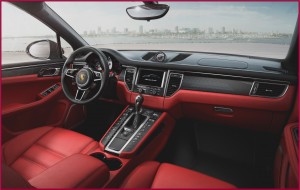Porsche introduced a new compact, five-passenger SUV, branded Macan, built from a Volkswagen architecture at the Los Angeles auto show today.
It is part of a VW Group global sales assault on the booming small SUV market and follows the Cayenne philosophy of offering multiple high-performance powertrains and a step ladder of options. Macan brings to six the number of cars and trucks Porsche offers, and in keeping with Porsche’s high costs, AutoInformed is betting that fully optioned the Macan will be close to $90,000.
 Macan – Indonesian for tiger – like Cayenne will be assembled in the East German town of Leipzig (Milestones – 500,000 Porsche Cayenne Made in Leipzig) on an expanded production line initially with 50,000 in annual capacity. Porsche sold 13,000 cars and trucks in the U.S. during October, which is its biggest market.
Macan – Indonesian for tiger – like Cayenne will be assembled in the East German town of Leipzig (Milestones – 500,000 Porsche Cayenne Made in Leipzig) on an expanded production line initially with 50,000 in annual capacity. Porsche sold 13,000 cars and trucks in the U.S. during October, which is its biggest market.
The Macan line at launch includes an S mode with a 3-liter V6 bi-turbo engine rated at 340 horsepower (250 kW) with an active all-wheel-drive system, which is used on all models. A seven-speed double-clutch transmission transfers power as required with a claimed acceleration from zero-to-100 km/h in 5.4 seconds (5.2 seconds with optional Sport Chrono package). The SUV reaches a top speed of 254 km/h, and its NEDC fuel consumption figures are between 9 and 8.7 liters/100 km (no EPA ratings yet), or a CO2 emissions level of between 212 and 204 g/km on premium fuel.
These emissions are far, far above proposed European Union standards calling for average emissions from new cars to 95 grams of CO2 per km (g CO2/km) in 2020 from 135.7g in 2011 and a mandatory target of 130g in 2015. Cars and vans account for around 15% of EU CO2 emissions, including emissions from fueling and supply operations. Macan’s curb weights ranging from 4200 pounds to more than 4700 pounds depending on equipment is not helping efficiency. (EU Pols Say Tough New CO2 Limits Will Create Auto Jobs)
The Macan S Diesel is the most, well, economical version. Its 3-liter V6 turbo diesel engine is rated on the European cycle with consumption of 6.3 and 6.1 liters/100 km, or a CO2 value of between 164 and 159 g/km. Nevertheless, the Diesel accelerates from zero-to-100 km in 6.3 seconds (or 6.1 seconds with the Sport Chrono package fitted) with its 258-horsepower (190-kW) engine, and achieves a top speed of 230 km/h. With diesel fuel at a premium in the U.S. and less performance, the Diesel has limited sales appeal here.
Most expensive Macan model line the Turbo is the most powerful vehicle in the compact SUV segment and no doubt the most expensive when prices are announced. The 3.6-liter V6 bi-turbo engine from the Volkswagen Group is being used in a Porsche model for the first time. It is rated at 400 horsepower (294 kW). This provides a claimed zero-to-100 km/h acceleration time in 4.8 seconds. With the Sport Chrono package fitted, 4.6 seconds is claimed. Top speed is 266 km/h, with fuel consumption figures of between just 9.2 and 8.9 liters/100 km, which equates to a CO2 value of between 216 and 208 g/km.
The Macan is off-road capable, if anyone cares. Pressing a button in the center console at speeds between 0 and 50 mph switches all the control systems to a traction-oriented off-road program. Shift points and speeds are geared towards a greater level of traction, the clutch is pre-tensioned to a greater degree in order to provide the front axle with the appropriate drive torque more rapidly, and the standard torque split between the front and rear axle as well as the accelerator pedal response are adapted to off-road conditions. The ground clearance can be increased 1.6 inches above its normal level with the optional air suspension chassis, which gives a maximum ground clearance of 9 inches.
The optional Porsche Torque Vectoring Plus system uses a variable standard torque split at the rear wheels combined with an electronically controlled rear-axle differential lock. In response to the steering angle, steering speed, accelerator pedal position, yaw rate and vehicle speed, the PTV Plus improves steering precision through targeted brake interventions on the inside rear wheel to enhance agility. This gives the outside rear wheel a greater tractive force and enables an additional turning impulse in the steered direction. Porsche claims that PTV Plus also makes a positive impact when the Macan is taken off-road. On loose ground, rear wheel spin is reduced through targeted locking and braking interventions.


